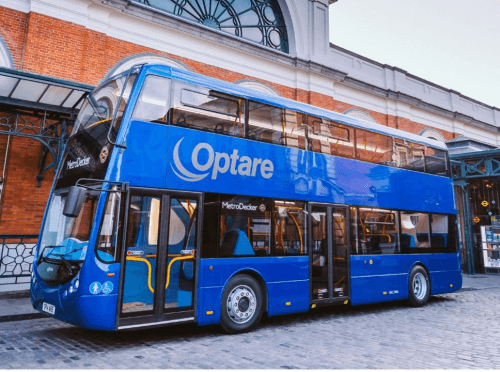Optare and Arcola Energy have announced a new hydrogen fuel cell bus for the UK and beyond: the Metrodecker H2.
With both bus and power system built in the UK, the two companies believe the new bus will make an important contribution to city air quality and a low carbon economic recovery.
Hydrogen fuel cell buses offer a zero-emission “drop-in” replacement for diesel buses. They are especially suited to busy, long-distance, high-capacity routes and complement the use of battery electric buses on shorter routes.
The Metrodecker H2 hydrogen bus product is built on the Optare Metrodecker EV platform. It incorporates a hydrogen fuel cell powerpack developed by Arcola Energy as a direct replacement for the battery powerpack in the Metrodecker EV. It can carry more than 90 passengers and offers a zero-emission range of between 200 and 250 miles depending on specification and route. The Metrodecker H2 complements Optare’s existing range of low and zero emission buses. Optare sees a significant export market for fuel cell buses to regions with high ambient temperatures, requiring high air-conditioning power.
The hydrogen fuel cell powertrain in the Metrodecker H2 is part of a family of products developed by Arcola Energy over the past ten years for a wide range of uses including lightweight cars, trucks, refuse collection vehicles, off-highway vehicles, buses and trains.
Base vehicles for the Metrodecker H2 will be serially produced at Optare’s factory in Sherburn-in-Elmet, near Leeds, on the existing production lines for the Metrodecker EV.
Hydrogen and fuel cell systems will be built by Arcola Energy at their existing Liverpool manufacturing facility, with plans well advanced for a second facility at the Michelin Scotland Innovation Parc in Dundee.
Dr Ben Todd, CEO of Arcola Energy said: “Our partnership with Optare is an important step forward, not just for Arcola Energy, but for hydrogen fuel cell vehicle deployment in the UK.
The innovative structural design of Optare buses makes them ideally suited to housing zero emission powertrains; and most importantly, to producing buses which we believe will be the safest, most efficient and easiest to maintain in their class“.
Graham Belgum, CEO of Optare Group Ltd commented: “We are delighted to be working in partnership with Arcola on this project. We believe fuel cell technology has the potential to complement Optare’s award winning battery electric vehicle range.
We look forward to working closely with Arcola to increase our understanding of the technology and its performance in service. We can see applications for fuel cells on inter urban routes in temperate climates and in high ambient environments where air conditioning is essential and energy consumption is high”.


